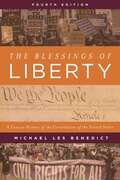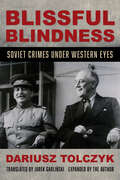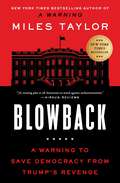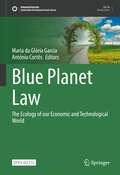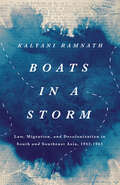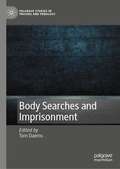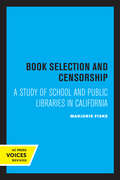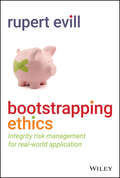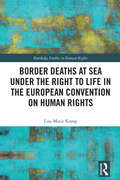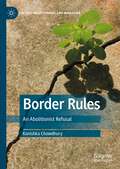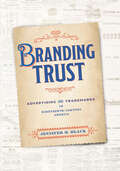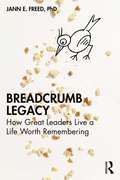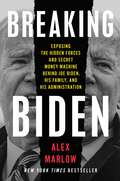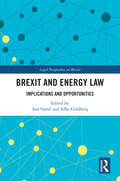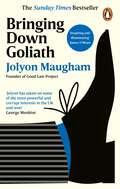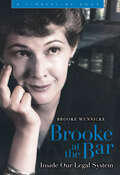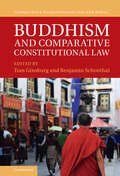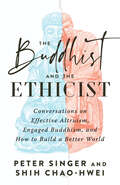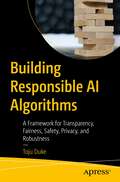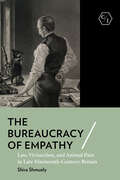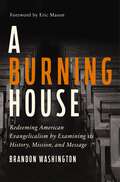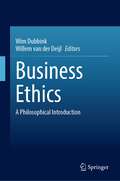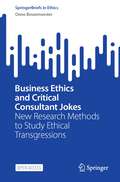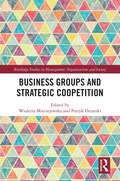- Table View
- List View
The Blessings of Liberty: A Concise History of the Constitution of the United States
by Michael Les BenedictThis concise, accessible text provides students with a history of American constitutional development in the context of political, economic, and social change. Constitutional historian Michael Benedict stresses the role that the American people have played over time in defining the powers of government and the rights of individuals and minorities. He covers important trends and events in U.S. constitutional history, encompassing key Supreme Court and lower-court cases. The volume begins by discussing the English and colonial origins of American constitutionalism. Following an analysis of the American Revolution's meaning to constitutional history, the text traces the Constitution's evolution from the Early Republic to the present day. This fourth edition is updated to include the 2016 election, the Trump administration, the 2020 election, and the first activities of the Biden administration.
Blissful Blindness: Soviet Crimes under Western Eyes
by Dariusz TołczykThe most heinous Soviet crimes – the Red Terror, brutal collectivization, the Great Famine, the Gulag, Stalin's Great Terror, mass deportations, and other atrocities – were treated in the West as a controversial topic. With the Cold War dichotomy of Western democracy versus Soviet communism deeply imprinted in our minds, we are not always aware that these crimes were very often questioned, dismissed, denied, sometimes rationalized, and even outright glorified in the Western world. Facing a choice of whom to believe –the survivors or Soviet propaganda– many Western opinion leaders chose in favor of Soviet propaganda. Even those who did not believe it behaved sometimes as if they did. Blissful Blindness explores Western reactions (and lack thereof) to Soviet crimes from the Bolshevik revolution to the collapse of Soviet communism in order to understand ideological, political, economic, cultural, personal, and other motivations behind this puzzling phenomenon of willful ignorance. But the significance of Dariusz Tolczyk's book reaches beyond its direct historical focus. Written for audiences not limited to scholars and specialists, this book not only opens one's eyes to rarely examined aspects of the twentieth century but also helps one see how astonishingly relevant this topic is in our contemporary world.
Blowback: A Warning to Save Democracy from the Next Trump
by Miles TaylorINSTANT NEW YORK TIMES BESTSELLER The author behind the &“eye-popping&” (CNN) #1 New York Times bestseller A Warning presents an urgent look at how our deeply divided nation is setting the stage for &“The Next Trump.&”Donald Trump will be president again, whether he is on the ballot or not. That is because Trumpism is overtaking the Republican Party and will mount a vigorous comeback, potentially in the hands of a savvier successor—The Next Trump. This prophecy will come true, according to Miles Taylor, if we do not learn the lessons of the recent past. With the 2024 election approaching, the formerly &“Anonymous&” official is back with bombshell revelations and a sobering national forecast. Through interviews with dozens of ex-Trump aides and government leaders, Taylor predicts what could happen inside &“Trump 2.0,&” the White House of a more competent and more formidable copycat. What sounds like a political thriller—from shadowy presidential powers and CIA betrayals to angry henchmen and assassination plots—is instead America&’s political reality, as Taylor uses untold stories to shed light on the ex-President&’s unfulfilled plans, the dark forces haunting our civic lives, and how we can thwart the rise of extremism in the United States. Blowback is also a surprisingly emotional and self-critical portrait of a dissenter, whose own unmasking provides a vivid warning about what happens when we hide the truth from others and, most importantly, ourselves.
Blue Planet Law: The Ecology of our Economic and Technological World (Sustainable Development Goals Series)
by Maria da Glória Garcia António CortêsBlue Planet Law is the global and future-oriented environmental law that is necessary to face the global environmental crisis in the Anthropocene, assuming especially the link between climate action (SDG 13) and ocean sustainability (SDG 14). This open access book focuses on means of overcoming global environmental problems such as climate change, ocean degradation and biodiversity loss and the consequent risks for human life, health, food and wellbeing. It explores how environmental law, at the international, European and national levels, might set economic and technological development on a more sustainable path. Law must engage in dialogue with other areas such as philosophy, economics, ecology, and biology. This book highlights protection of the climate and the oceans and sustainable use of natural resources, through new policies, economies and technologies, including biotechnology, with a view to the preservation of life, health, food and a healthy environment for the present and future generations. The book may be seen as a contribution to the UN Sustainable Development Goals 13 and 14 and a tribute to the Declaration of the United Nations Conference on the Human Environment, also known as the Stockholm Conference (1972), on its 50th Anniversary.
Boats in a Storm: Law, Migration, and Decolonization in South and Southeast Asia, 1942–1962 (South Asia in Motion)
by Kalyani RamnathFor more than century before World War II, traders, merchants, financiers, and laborers steadily moved between places on the Indian Ocean, trading goods, supplying credit, and seeking work. This all changed with the war and as India, Burma, Ceylon, and Malaya wrested independence from the British empire. Set against the tumult of the postwar period, Boats in a Storm centers on the legal struggles of migrants to retain their traditional rhythms and patterns of life, illustrating how they experienced citizenship and decolonization. Even as nascent citizenship regimes and divergent political trajectories of decolonization papered over migrations between South and Southeast Asia, migrants continued to recount cross-border histories in encounters with the law. These accounts, often obscured by national and international political developments, unsettle the notion that static national identities and loyalties had emerged, fully formed and unblemished by migrant pasts, in the aftermath of empires. Drawing on archival materials from India, Sri Lanka, Myanmar, London, and Singapore, Kalyani Ramnath narrates how former migrants battled legal requirements to revive prewar circulations of credit, capital, and labor, in a postwar context of rising ethno-nationalisms that accused migrants of stealing jobs and hoarding land. Ultimately, Ramnath shows how decolonization was marked not only by shipwrecked empires and nation-states assembled and ordered from the debris of imperial collapse, but also by these forgotten stories of wartime displacements, their unintended consequences, and long afterlives.
Bodies, Territories and Serious Violations of Human Rights in Mexico (SpringerBriefs in Criminology)
by Miguel Angel Martínez MartínezThis book seeks to contribute to the analysis of the serious violations of human rights in Mexico during the processes of democratic transition and the "War on Drugs" by taking bodies and territories as archives of the crimes committed by the Mexican State in the last decades. The text presents an analysis of the disappearance of persons, forced internal displacement, and gender violence as systematic expressions of State violence. These fields of research allow us to point out tensions between social practices and the institutional fragility that systematically denies human rights violations while at the same time ratifies and celebrates them.The thematic knotting between bodies and territories is anchored in the processes of shaping a memory that expresses State violence and presents the silenced resistances of minority social groups that elude the traditional forms of registration, control and collection of data. From these coordinates, body-territories are approached as scenarios where intersectionally-knotted violences unfold. The theoretical approaches considered are mobilized through a critical approach to capitalism, colonialism and patriarchy in order to analyze public policies and narratives related to the protection of bodies-territories, as well as the responses to the needs, interests and preferences of different groups and individuals whose lives are marked by the experience of serious human rights violations. Finally, this approach also considers the new ways in which crimes against humanity unfold in situations of democratic transition, as well as the forms of symbolic exchanges in the transmission of meaning and community bonding. Bodies, Territories and Serious Violations of Human Rights in Mexico will be of interest to academic researchers and graduate students in different fields of knowledge, such as criminology, sociology, history, anthropology, philosophy, psychology and the interdisciplinary field of human rights studies.
Body Searches and Imprisonment (Palgrave Studies in Prisons and Penology)
by Tom DaemsThis book explores and addresses body search practices in prison environments from different angles (criminology, sociology, human rights and law) and discusses such practices in different national contexts within Europe. Body searches are widely used in prison systems across the globe: they are perceived as indispensable to prevent forbidden substances, weapons or communication devices from entering the prison. However, these are also invasive and potentially degrading control techniques. It should not come as a surprise, then, that body searches are deeply contested security measures and that they have been widely debated and regulated. What makes theses control measures problematic in a prison context? How do these practices come to be regulated in an international and European context? How are rules translated into national law? To what extent are laws and rules respected, bent, circumvented and denied? And what does the future hold for body searches?
Book Selection and Censorship: A Study of School and Public Libraries in California
by Marjorie FiskeThis title is part of UC Press's Voices Revived program, which commemorates University of California Press’s mission to seek out and cultivate the brightest minds and give them voice, reach, and impact. Drawing on a backlist dating to 1893, Voices Revived makes high-quality, peer-reviewed scholarship accessible once again using print-on-demand technology. This title was originally published in 1969.
Bootstrapping Ethics: Integrity Risk Management for Real-World Application
by Rupert EvillPractical, cost-effective tools for personal and organizational risk mitigation In Risk Management: Tools, Tips, and Techniques to Help Your Organization Achieve Its Strategic Goals, accomplished fraud investigator and risk advisor Rupert Evill delivers a smart, simple, and hands-on guide to managing risk and ethics in your organization. You&’ll learn to protect yourself, your organization, and your stakeholders from regulatory and other risks with frontline-tested strategies and frameworks designed to achieve both quick wins and long-term risk mitigation. In the book, the author shows you how to create tangible economic returns by reducing organizational exposure to common—and not-so-common—risks by promoting the right values, managing conflict, prioritizing the communities you serve, and preventing discrimination and harassment against your employees. You&’ll also: Learn to manage external stakeholders and their expectations Keep your risk mitigation strategies cost-effective and straightforward so you can scale them throughout your organization Get on top of your diversity, equity, and inclusion efforts and make sure they&’re getting resultsA can&’t-miss resource for purpose-driven changemakers looking to maximize their impact at the organizations they serve and in the world, Risk Management is also the tactical and practical antidote to the seemingly endless stream of new regulations and oversight facing many modern firms.
Border Deaths at Sea under the Right to Life in the European Convention on Human Rights (Routledge Studies in Human Rights)
by Lisa-Marie KompThis book focuses on border deaths at sea. It unravels how the interplay of the law of the sea and rules on jurisdiction widen the opportunity for states to make and enforce rules outside their territory, and questions whether this is also accompanied with an obligation to respect the right to life under the European Convention on Human Rights (ECHR) when doing so. By embarking upon the challenge of analysing a cross-border phenomenon in which direct encounters between state agents and the victims are few through the lens of legal obligations, the book unearths avenues for arguing that the ECHR is applicable to border deaths on the high seas and showcases the Court’s creativity in bridging the gap between the Convention and people in need of protection. Furthermore, it demonstrates that the ECHR is applicable to border deaths occurring within the territorial seas of states. It discusses the right to life, as well as the specific obligations of states in respect to border deaths at sea, and demonstrates that in many instances, EU policies fall short of the standards set under the right to life. This book will be of key interest to scholars, students and practitioners in migrant rights, international human rights law, public international law including, refugee and migration law, maritime law, and security studies.
Border Rules: An Abolitionist Refusal (Politics of Citizenship and Migration)
by Kanishka ChowdhuryThis book examines both border policies and oppositional narratives of “the border,” 2011–2021, demonstrating that the term designates not merely a line of territorial control but also a set of social relations shaped by persistent, racially differentiated colonial structures and, more recently, by neoliberal modes of accumulation. These relations are shown to determine access to wealth and/or resources and to enable the management of labor, the extraction of surplus, and the accumulation of capital. Discussion in the book is informed by the history of these policies and by the critical literature on borders. Various cultural texts focusing on two border zones—the US–Mexico and the EU–Southern Mediterranean—are analyzed: specifically, two novels, two films, and two murals examined in conjunction with a music video. A path to a borderless future is suggested: an abolitionist refusal of border rules with an insistence on the necessity of abolition.
Branding Trust: Advertising and Trademarks in Nineteenth-Century America (American Business, Politics, and Society)
by Jennifer M. BlackIn the early nineteenth century, the American commercial marketplace was a chaotic, unregulated environment in which knock-offs and outright frauds thrived. Appearances could be deceiving, and entrepreneurs often relied on their personal reputations to close deals and make sales. Rapid industrialization and expanding trade routes opened new markets with enormous potential, but how could distant merchants convince potential customers, whom they had never met, that they could be trusted? Through wide-ranging visual and textual evidence, including a robust selection of early advertisements, Branding Trust tells the story of how advertising evolved to meet these challenges, tracing the themes of character and class as they intertwined with and influenced graphic design, trademark law, and ideas about ethical business practice in the United States.As early as the 1830s, printers, advertising agents, and manufacturers collaborated to devise new ways to advertise goods. They used eye-catching designs and fonts to grab viewers’ attention and wove together meaningful images and prose to gain the public’s trust. At the same time, manufacturers took legal steps to safeguard their intellectual property, formulating new ways to protect their brands by taking legal action against counterfeits and frauds. By the end of the nineteenth century, these advertising and legal strategies came together to form the primary components of modern branding: demonstrating character, protecting goodwill, entertaining viewers to build rapport, and deploying the latest graphic innovations in print. Trademarks became the symbols that embodied these ideas—in print, in the law, and to the public.Branding Trust thus identifies and explains the visual rhetoric of trust and legitimacy that has come to reign over American capitalism. Though the 1920s has often been held up as the birth of modern advertising, Jennifer M. Black argues that advertising professionals had in fact learned how to navigate public relations over the previous century by adapting the language, imagery, and ideas of the American middle class.
Breadcrumb Legacy: How Great Leaders Live a Life Worth Remembering
by Jann E. FreedLegacy can seem far off and out of reach, but it doesn’t happen at journey’s end and it’s not only for the rich and famous. Legacy is now, and this book shows leaders how you can find and leave meaning on a daily basis. Jann E. Freed, PhD, introduces her Breadcrumb Legacy™ framework, a radical but pragmatic approach, made up of small actions you consciously take over time that accumulate into the trail, or legacy, you’ll leave behind. Breadcrumb Legacy is also a mindset, an awareness of the impact you’re having on your relationships, your organization, and your family, in every communication and interaction. This book is the guide to leaving a trail of meaning throughout your life and career. Based on in-depth interviews, Breadcrumb Legacy provides inspiration and practical stories for living a life worth remembering.
Breaking Biden: Exposing the Hidden Forces and Secret Money Machine Behind Joe Biden, His Family, and His Administration
by Alex MarlowINSTANT NEW YORK TIMES BESTSELLER The New York Times bestselling author of the &“must-read&” (Sean Hannity) Breaking the News and editor-in-chief of Breitbart News Network returns with this timely and eye-opening deep dive investigation into the 46th president.Over his 50-year career in Washington, Joe Biden has become known for his wild dishonesty, embarrassing policy failings, and an absolute lack of accountability, culminating in his predictably unpopular presidency. But what has not yet been revealed is the vast web of consultants, bureaucrats, corporate titans, foreign interests, and various extended family members (it&’s not just Hunter!) who have achieved unfathomable wealth and power while keeping Biden in charge. Now, Alex Marlow reports the findings of a shocking, in-depth investigation into the individuals and entities behind the devastating decisions that have empowered the global elite at the expense of the American public. With his signature &“prescient&” (Tucker Carlson) writing, Marlow unearths new details such as: EXPOSED: The secret cadre of consultants running Joe Biden&’s Washington. EXPLAINED: How Joe Biden sold America&’s intellectual property to communist China. UNCOVERED: The unreported and audacious reason the underwhelming, under-qualified, and unpopular Kamala Harris was chosen to be vice president. REVEALED: All the ways the Bidens&’ bag cash off of the family name.
Brexit and Energy Law: Implications and Opportunities (Legal Perspectives on Brexit)
by Ana Stanič and Silke GoldbergBringing together leading experts from across the UK and Europe, this book provides a comprehensive analysis of the impact of Brexit on the energy sector in the UK and in the European Union and its Member States. In recent decades, the trend within the EU has been towards greater integration and liberalisation of energy markets. Through the development of the Union’s internal energy market and the funding of cross-border energy infrastructure, EU membership facilitates cross-border trade in energy, promotes security of energy supply, and, via the European Atomic Energy Community (Euratom), allows EU Member States to trade in nuclear material for energy production. Brexit changes all of this. The significant level of integration and interdependence in EU energy policy means that the UK’s departure from the Union poses many challenges for the UK, the EU, and EU Member States. While certain energy-related arrangements have been addressed, the relationship between the UK and EU in the energy sector has been changed fundamentally. In this context, important and interrelated questions arise, such as the following: Under what terms will energy trading between the EU and UK now take place? What access will the UK have to EU energy markets? What does Brexit mean for the security of energy supply? What does the UK’s departure from Euratom mean for nuclear research? Can the crossborder single energy market (SEM) on the island of Ireland continue following Brexit? What implications does Brexit have for renewables, the environment, and climate change? Brexit comes at a time when the European energy sector is undergoing the processes of decarbonisation and energy transition. This book offers researchers, legal practitioners, and policy advisers in-depth understanding of the interplay between these challenges and Brexit.
Bringing Down Goliath: How Good Law Can Topple the Powerful
by Jolyon Maugham*The Sunday Times Bestseller*'Inspiring and illuminating' JAMES O'BRIENPicked as a 2023 highlight by the Guardian---------------Our legal system often feels like it only works for the rich and powerful. But we can fight back.Jolyon Maugham KC founded Good Law Project in 2017 with the belief that the law can also put power into the hands of ordinary people. Already the largest legal campaign group in the UK, Good Law Project is shining light into corners the establishment would rather keep dark – from the failures of Brexit to the still-developing PPE scandal, to the tax arrangements of business giants like Uber.In Bringing Down Goliath, Jolyon Maugham KC reveals the story behind these landmark cases and the hidden fault lines of our judicial system. He offers an empowering, bold new vision for how the law can work better for all of us in the fight against injustice.
Brooke at the Bar: Inside Our Legal System (Timberline Books)
by Brooke WunnickeBrooke at the Bar is a candid, lively, and sometimes humorous autobiography by Brooke Wunnicke, the first woman to be a trial and appellate attorney in Wyoming and who went on to become a legal legend in Colorado. In conversational writing, Brooke provides insights from a lawyer, mentor, and educator. She advocates that, while not perfect, the United States has the world’s best legal system and that all citizens need to understand and protect their rights, freedoms, and responsibilities. Brooke shares vignettes of her early life—California in the Great Depression, college at Stanford, law school in Colorado during World War II, and the 1946 opening of her Cheyenne law office, a precedent for women in law. She vividly describes memorable and amusing experiences with clients, witnesses, lawyers, juries, and judges and explains some significant cases. She recounts important and dynamic events from her twelve years as Denver’s chief appellate deputy district attorney, an era during which she was an inestimable mentor to many young lawyers who became prominent in the private and public sectors. Brooke passionately believed “the law has been and will continue to be civilization’s hope.” In her book’s final part, she demystifies many legal terms and procedures and describes the parts of a civil jury trial—including information for jurors and witnesses—and provides an enthusiastic and clear refresher on the US Constitution and Bill of Rights. Brooke at the Bar is a unique and historically important contribution that will be of interest to general readers, scholars, and students interested in US law, political science, government, women’s history, twentieth-century western history, civil rights, and legal communities, including those in Wyoming and Colorado, where Brooke was “at the Bar.”
Buddhism and Comparative Constitutional Law: The Pyrrhic Constitutionalism Of Sri Lanka (Comparative Constitutional Law and Policy)
by Tom Ginsburg Benjamin SchonthalBuddhism and Comparative Constitutional Law offers the first comprehensive account of the entanglements of Buddhism and constitutional law in Sri Lanka, Myanmar, Thailand, Cambodia, Vietnam, Tibet, Bhutan, China, Mongolia, Korea, and Japan. Bringing together an interdisciplinary team of experts, the volume offers a complex portrait of “the Buddhist-constitutional complex,” demonstrating the intricate and powerful ways in which Buddhist and constitutional ideas merged, interacted and co-evolved. The authors also highlight the important ways in which Buddhist actors have (re)conceived Western liberal ideals such as constitutionalism, rule of law, and secularism. Available Open Access on Cambridge Core, this trans-disciplinary volume is written to be accessible to a non-specialist audience.
The Buddhist and the Ethicist: Conversations on Effective Altruism, Engaged Buddhism, and How to Build a Better World
by Peter Singer Shih Chao-HweiEastern spirituality and utilitarian philosophy meet in these unique dialogues between a Buddhist monastic and a moral philosopher on such issues as animal welfare, gender equality, the death penalty, and moreAn unlikely duo—Professor Peter Singer, a preeminent philosopher and professor of bioethics, and Venerable Shih Chao-Hwei, a Taiwanese Buddhist monastic and social activist—join forces to talk ethics in lively conversations that cross oceans, overcome language barriers, and bridge philosophies. The eye-opening dialogues collected here share unique perspectives on contemporary issues like animal welfare, gender equality, the death penalty, and more. Together, these two deep thinkers explore the foundation of ethics and key Buddhist concepts, and ultimately reveal how we can all move toward making the world a better place.
Building Responsible AI Algorithms: A Framework for Transparency, Fairness, Safety, Privacy, and Robustness
by Toju DukeThis book introduces a Responsible AI framework and guides you through processes to apply at each stage of the machine learning (ML) life cycle, from problem definition to deployment, to reduce and mitigate the risks and harms found in artificial intelligence (AI) technologies. AI offers the ability to solve many problems today if implemented correctly and responsibly. This book helps you avoid negative impacts – that in some cases have caused loss of life – and develop models that are fair, transparent, safe, secure, and robust.The approach in this book raises your awareness of the missteps that can lead to negative outcomes in AI technologies and provides a Responsible AI framework to deliver responsible and ethical results in ML. It begins with an examination of the foundational elements of responsibility, principles, and data. Next comes guidance on implementation addressing issues such as fairness, transparency, safety, privacy, and robustness. The book helps you think responsibly while building AI and ML models and guides you through practical steps aimed at delivering responsible ML models, datasets, and products for your end users and customers. What You Will LearnBuild AI/ML models using Responsible AI frameworks and processesDocument information on your datasets and improve data qualityMeasure fairness metrics in ML modelsIdentify harms and risks per task and run safety evaluations on ML modelsCreate transparent AI/ML modelsDevelop Responsible AI principles and organizational guidelinesWho This Book Is ForAI and ML practitioners looking for guidance on building models that are fair, transparent, and ethical; those seeking awareness of the missteps that can lead to unintentional bias and harm from their AI algorithms; policy makers planning to craft laws, policies, and regulations that promote fairness and equity in automated algorithms
The Bureaucracy of Empathy: Law, Vivisection, and Animal Pain in Late Nineteenth-Century Britain (Corpus Juris: The Humanities in Politics and Law)
by Shira ShmuelyThe Bureaucracy of Empathy revolves around two central questions: What is pain? And how do we recognize, understand, and ameliorate the pain of nonhuman animals? Shira Shmuely investigates these ethical issues through a close and careful history of the origins, implementation, and enforcement of the 1876 Cruelty to Animals Act of Parliament, which for the first time imposed legal restrictions on animal experimentation and mandated official supervision of procedures "calculated to give pain" to animal subjects.Exploring how scientists, bureaucrats, and lawyers wrestled with the problem of animal pain and its perception, Shmuely traces in depth and detail how the Act was enforced, the medical establishment's initial resistance and then embrace of regulation, and the challenges from anti-vivisection advocates who deemed it insufficient protection against animal suffering. She shows how a "bureaucracy of empathy" emerged to support and administer the legislation, navigating incongruent interpretations of pain. This crucial moment in animal law and ethics continues to inform laws regulating the treatment of nonhuman animals in laboratories, farms, and homes around the worlds to the present.
A Burning House: Redeeming American Evangelicalism by Examining Its History, Mission, and Message
by Brandon WashingtonDespite the civil rights progress he fought for and saw on the horizon in the 1950s and '60s, Martin Luther King Jr.—increasingly concerned by America's moral vision, admitted—"I've come to believe that we are integrating into a burning house."In A Burning House, Brandon Washington contends that American Evangelicalism is a house ablaze: burning in the destructive fires of discrimination and injustice. The stain of segregation remains prevalent, not only in our national institutions, but also in our churches, and this has long tarnished the witness of Christianity and hampered our progress toward a Christ-like vision of Shalom—peace, justice, and wholeness—in the world. Common doctrine may unite black and white evangelicals, but rifts such as social ethics and cultural influences still separate us.Throughout this challenging but reconciliatory book, Washington gives a historical and theological appraisal of American evangelicalism to understand how we came to be where we are and what our response should be. Instead of calling the movement to become something new, he challenges it to live into what it has always been in Christ and strive for deliberate and sacrificial integration—the unity of believers of all ethnicities.A Burning House is a rallying call to a waning movement whose most public leaders have often turned a blind eye to, or even justified, the sin of racism—a movement whose theology is sometimes compromised by a secular anthropology. This is a call to both white and black evangelicals to better understand our past so that we can better embrace the unifying and comprehensive message of the gospel we preach.
Business Ethics: A Philosophical Introduction
by Wim Dubbink Willem van der DeijlThis textbook not only provides the student with a solid foundation in ethics, but introduces students to the most important themes relevant to business today. Issues such as human rights violation down in the supply chain, the effect business has on nature and the environment, and inclusiveness are each discussed in separate chapters, which discuss their importance, but also their challenges. While there are numerous business ethics textbooks, few take a philosophical approach to business ethics. However, without introducing philosophical ethics, discussions about business ethics are bound to get stuck in fallacies and paradoxes. This textbook therefore fills an important societal gap by providing an introduction to profound philosophical issues in clear language at a philosophically high, but accessible level.
Business Ethics and Critical Consultant Jokes: New Research Methods to Study Ethical Transgressions (SpringerBriefs in Ethics)
by Onno BouwmeesterThis open access book offers four ways to enrich traditional research methods in business ethics. By looking at critical jokes and cartoons on management consultants, their business practice and their clients’ demands, many ethical transgressions in business get addressed. By illustrating and criticizing such transgression, jokes can serve as an example in a theoretical argument, as a prompt to reflect on in an open interview, as a statement to assess in an enquiry or as basis for qualitative content analysis. By adding jokes to the conversation on ethical transgressions in business much depth and honesty can be added, resulting in better research data. Jokes can help to surpass social desirability bias included in answers given in traditional interview settings or enquiries. This book is of interest to consultants, researchers, educators and students in business ethics and management. The book showcases what kind of practical and ethical wisdom is embedded in business jokes and how this knowledge can be made productive in the context of business ethics.
Business Groups and Strategic Coopetition (Routledge Studies in Management, Organizations and Society)
by Wioletta Mierzejewska Patryk DziurskiBusiness Groups and Strategic Coopetition sheds lights on the poorly recognised problem of intra-organisational relationships within business groups by adopting the coopetition lens. It brings together the strategic management (coopetition and performance) and international management perspectives (business groups and its role in the economy). It is a unique proposition as those two research streams, such as business groups and coopetition, are rarely assessed together. The coopetition, which is seen as the strategy of value creating in the rapidly changing environment, brings benefits, such as an increased innovation, cost reduction, access to resources, and improved competitive position that could be capture by business groups as well. However, the understanding of complex organisations, such as business group, and answering the question how to manage intra-level coopetition to gain better performance therein is still unclear. Therefore, the book aims to extends the knowledge in the field of internal relationships within business groups as well as the coopetition phenomenon. This book is written to meet needs of researchers, students as well as managers and to present an integrated view on the coopetition within business groups.
